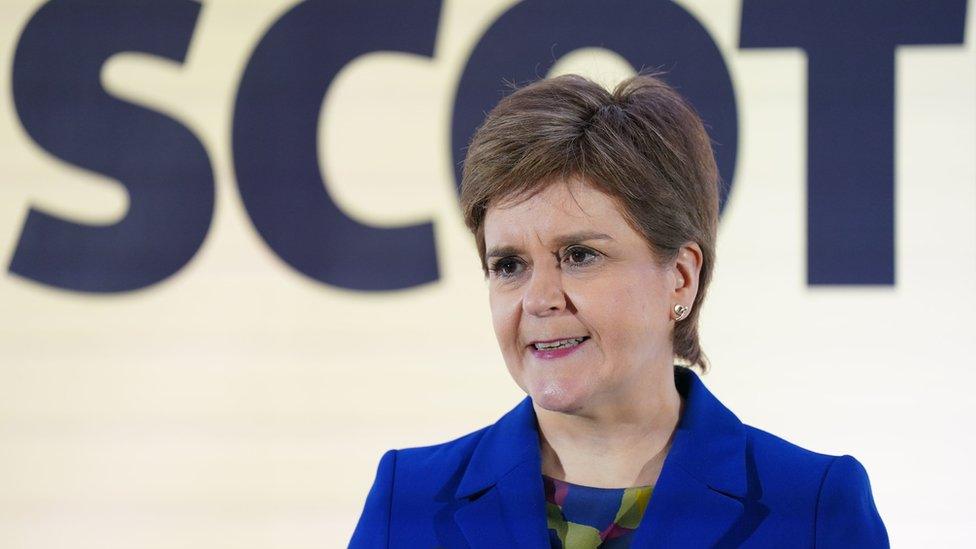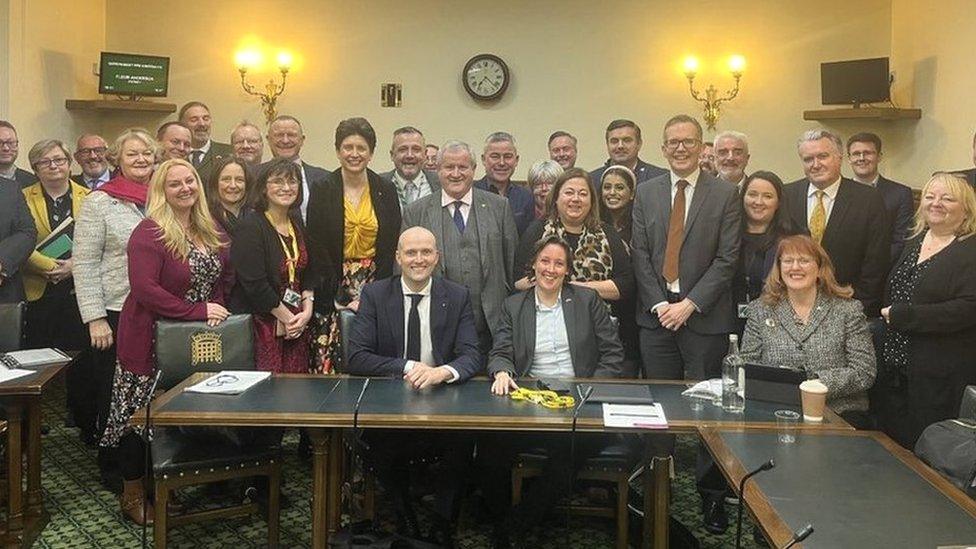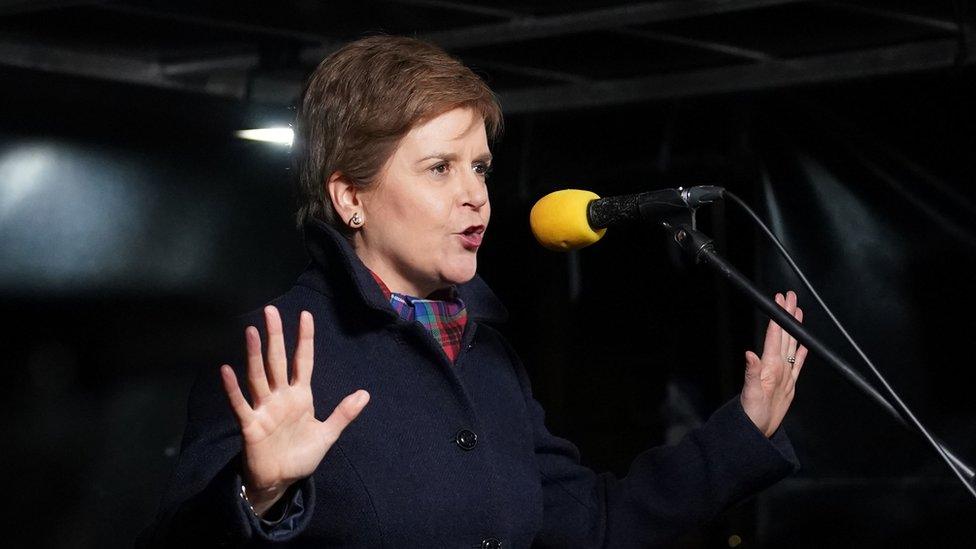Is Nicola Sturgeon losing her grip on the SNP?
- Published

Nicola Sturgeon has welcomed Stephen Flynn's victory
The election of Stephen Flynn as the SNP's Westminster leader has been portrayed by other parties as a blow for the authority of First Minister Nicola Sturgeon.
Mr Flynn is replacing a close ally of Ms Sturgeon in Ian Blackford, and won a contest against another in Alison Thewliss.
But with the two politicians insisting they will work together towards their shared goal of Scottish independence, has talk of divisions within Scotland's most dominant political force been overstated?

The SNP has been quick to dismiss any notion of schisms within the party as "complete fiction".
Ms Sturgeon swiftly congratulated, external Mr Flynn and his deputy Mhairi Black as a "truly formidable team", saying she was "looking forward to working with them both".
She has also insisted that the move to replace Mr Blackford was "not a coup" - but it is a fact that Mr Flynn's name was being linked with moves to replace the Ross, Skye and Lochaber MP in the weeks before he decided to step down.
Mr Flynn initially denied he was planning a leadership bid despite talk of him being "on manoeuvres".
But the Aberdeen South MP has since conceded that something was going on, stating, external that "it's not unusual in political parties for people to court the support or opinion of their colleagues".
This came off the back of months of speculation about whether there could be a change, which was so widespread that Boris Johnson used to poke fun at Mr Blackford about it on a weekly basis at prime minister's questions.
Mr Flynn was floated as an alternative who might prove a punchier figure, who would have more of a go at the Westminster establishment - and perhaps, whispered some, the SNP's internal one.
After Mr Blackford announced his departure, Mr Flynn hoped for a coronation - one ally told BBC Scotland they would be "astonished" if anyone else ran for the job - and it is understood that the 34-year-old met Ms Sturgeon for talks.
However those hopes were dashed when Alison Thewliss - a Glasgow MP widely seen as being much closer to the first minister - announced she would be running.
Ms Thewliss stressed her credentials as a "team player", saying she would "work closer and smarter, external" with the Scottish government, and ultimately won the backing of 17 MPs to Mr Flynn's 26.
So it may be the case that recent events have not played out in exactly the way either Mr Flynn or Ms Sturgeon might have wanted.
But now that Mr Flynn is in the post, both will be looking forward - because the role of the SNP's Westminster group might be about to become more important than ever before.
Stephen Flynn takes part in his first Prime Minister's Questions
With plans for an independence referendum next year having hit the buffers, the party is looking to use the next general election as a single-issue campaign.
That means the constitutional question could be answered not by people voting Yes or No, but by putting a cross in a box next to the name of someone like Stephen Flynn or Alison Thewliss.
MPs like John McNally and Marion Fellows may not have garnered a huge profile in politics to date, but they are going to be on the frontline of what their party hopes will be the decisive contest in its independence campaign.
There have been some rumblings about the strategy already, with high profile MP Angus MacNeil suggesting that a snap Holyrood election might be better suited as a "de facto referendum" than a general election would be.
And Ms Black and Stewart McDonald have both sought to talk down some of the rhetoric which flew around about Scotland being "oppressed" or a "colony" in the wake of November's Supreme Court ruling.
So the key question about Mr Flynn's regime is whether he can pull his group together and get them marching in unison ahead of the next election, which is currently expected in 2024.

Mr Flynn (sitting alongside new deputy leader Mhairi Black) was elected as the SNP's Westminster leader at the group's AGM on Tuesday evening
The Westminster group has always been slightly more restive, being further from Ms Sturgeon's control and lacking a clear purpose as the third party in a parliament all of its members would like to leave.
But there have been rumblings of discontent in the first minister's back yard at Holyrood too.
In October, the SNP suffered its largest ever backbench rebellion over the government's plans to make it easier for people to change their legally recognised gender.
One minister resigned to vote against the plans, and eight other MSPs broke the whip - accounting for 20% of the party's backbench group.
That bill is due back in parliament in the days before the Christmas break, and there will be a series of further votes on amendments before the big vote whether the bill becomes law.
It is still expected to pass, and ministers hope this will put the issue to bed at least from a parliamentary standpoint.
And it is fair to say that there are not many other issues like gender reform coming up at Holyrood on which SNP members would be likely to rebel en masse.
But there has been criticism on some other fronts too, with SNP members of Holyrood's finance committee hitting out about the lack of detail in financial plans for the National Care Service.
The same committee is set to hold an inquiry into "effective decision-making by government".
It's possible this could signal an outbreak of independent thinking from MSPs in a parliament where party whips have been utterly dominant.

Ms Sturgeon's goal is to keep the independence movement marching in unison, even as she changes strategy
Does all of this add up to a real headache for Ms Sturgeon?
It may be more the case that these grumbles are side-effects of the greater question facing the independence movement, as its strategy begins to pivot away from holding a referendum next year.
For the entirety of Ms Sturgeon's record-breaking tenure as first minister, the plan has been to secure and win a referendum.
She has repeatedly predicted that Westminster opposition to indyref2 would prove unsustainable, and would crumble in the face of one more electoral mandate. It has not.
And having pushed a case to the Supreme Court and lost, the SNP leader is now drawing up plans for a de facto referendum - an approach she previously used to write off as a "unionist trap", external when proposed by opponents within the SNP.
There are a great many questions to be answered about how a de facto referendum would work, and whether it could actually deliver independence with international recognition.
It may be that this uncertainty is what has sparked questions about Ms Sturgeon's grip on her party too.
She will hold a special party conference in the new year in a bid to settle the issue of process - and if she can do that, it's entirely possibly she will put the wider questions about her authority to bed too.
If the independence movement and its political representatives are focused on the greater prize and feel it is truly close at hand, they will frankly have less time to spend on infighting.
And unlike at Westminster, there does not appear to be any particular challenge to Ms Sturgeon's leadership from ambitious colleagues.
Not only is nobody plotting a move against the first minister, the leadership doesn't seem to have any succession plans of its own in the pipeline.
There are few obvious signs of a future first minister being groomed within the ministerial team.
So in the next phase of the debate, Ms Sturgeon's position is still assured. But given she is hoping the coming years will answer the constitutional question once and for all, this period will likely prove decisive in terms of her own future too.